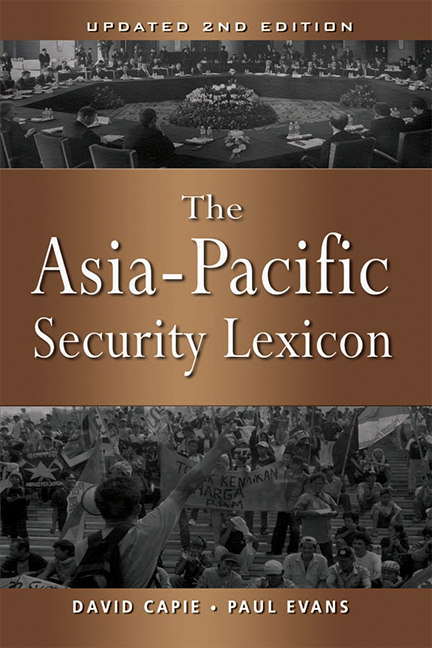Book contents
- Frontmatter
- Contents
- Abbreviations
- Introduction to the Second Edition
- Ad Hoc Multilateralism
- A la Carte Multilateralism
- The “ASEAN Way”
- Balance of Power
- Bilateralism
- Coalition of the Willing
- Coercive Diplomacy
- Collective Defence
- Collective Security
- Common Security
- Comprehensive Security
- Concert of Powers
- Concerted Unilateralism
- Confidence-Building Measures
- Confidence- and Security-Building Measures
- Constructive Intervention
- Cooperative Security
- Engagement
- Flexible Consensus
- Human Security
- Humanitarian Intervention
- Middle Power
- Multilateralism
- Mutual Security
- New Security Approach
- Non-Traditional Security
- Open Regionalism
- Peaceful Rise
- Pre-emption and Preventive War
- Preventive Diplomacy
- Security Community
- Terrorism
- Track One
- Track One-and-a-Half
- Track Two
- Track Three
- Transparency
- Trust-Building Measures
- About the Authors
Terrorism
Published online by Cambridge University Press: 21 October 2015
- Frontmatter
- Contents
- Abbreviations
- Introduction to the Second Edition
- Ad Hoc Multilateralism
- A la Carte Multilateralism
- The “ASEAN Way”
- Balance of Power
- Bilateralism
- Coalition of the Willing
- Coercive Diplomacy
- Collective Defence
- Collective Security
- Common Security
- Comprehensive Security
- Concert of Powers
- Concerted Unilateralism
- Confidence-Building Measures
- Confidence- and Security-Building Measures
- Constructive Intervention
- Cooperative Security
- Engagement
- Flexible Consensus
- Human Security
- Humanitarian Intervention
- Middle Power
- Multilateralism
- Mutual Security
- New Security Approach
- Non-Traditional Security
- Open Regionalism
- Peaceful Rise
- Pre-emption and Preventive War
- Preventive Diplomacy
- Security Community
- Terrorism
- Track One
- Track One-and-a-Half
- Track Two
- Track Three
- Transparency
- Trust-Building Measures
- About the Authors
Summary
Terrorism is now one of the most frequently used terms in the contemporary Asia-Pacific security discourse. It is also strongly contested, with little international consensus on what constitutes either an act of terrorism or a terrorist group. It is clear that terrorism involves some sort of violent activity, but what kind of violence is to be labelled terrorism is a key question. Unhelpfully, interpretations range from “any violent threat to existing order” to the assertion that the term “terrorism” is merely a pejorative label with no substantive meaning.
The origins of the word “terrorism” are usually traced to the French Revolution. In 1792 the Jacobins came to power and launched a bloody purge of counter-revolutionaries that came to be known simply as “the terror”. Led by Robespierre, the terror was described as “nothing but justice, prompt, severe and inflexible” and thousands were executed at the guillotine. Edmund Burke's 1795 condemnation of the revolutionaries as “those hellhounds called terrorists [who] are let loose on the people” is the first recorded use of the term.
Attempts to define terrorism for legal purposes go back at least as far as the League of Nations. An international convention debated by the League in 1937 described “terrorism” as “all criminal acts directed against a State and intended or calculated to create a state of terror in the minds of particular persons or a group of persons or the general public”. However, the convention never came into force because of a lack of ratification by member states.
Despite ongoing disagreement, there have been a number of attempts to define terrorism by international bodies such as the United Nations. Most of these modern definitions have a common core, namely that terrorism involves the use of violence, usually against civilians or non-combatants, for the purpose of provoking a state of terror in order to advance a specific political, religious or ideological cause. A small sample of national and international definitions is offered below.
- Type
- Chapter
- Information
- The Asia-Pacific Security Lexicon (Upated 2nd Edition) , pp. 221 - 228Publisher: ISEAS–Yusof Ishak InstitutePrint publication year: 2007



